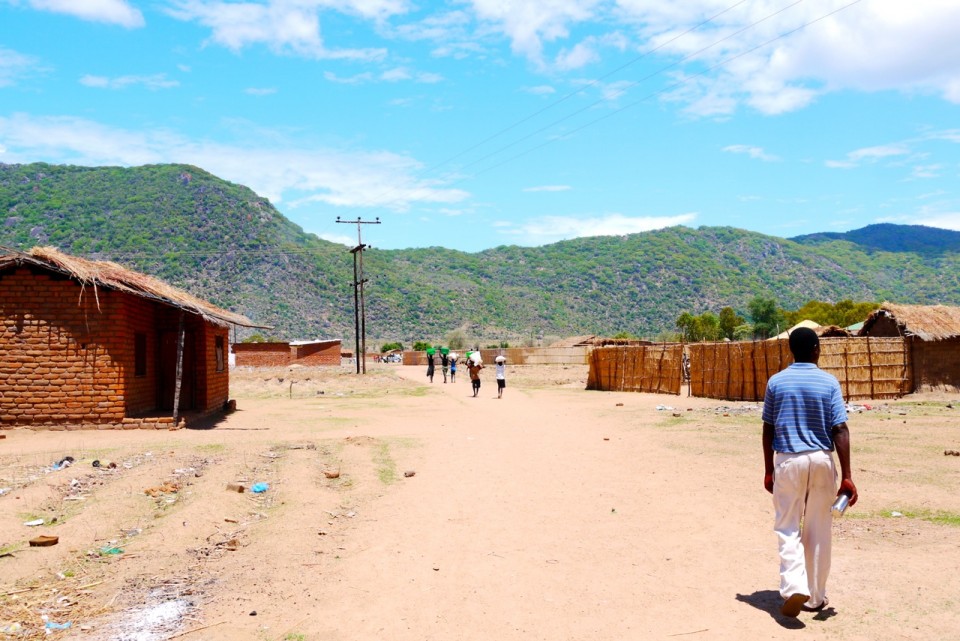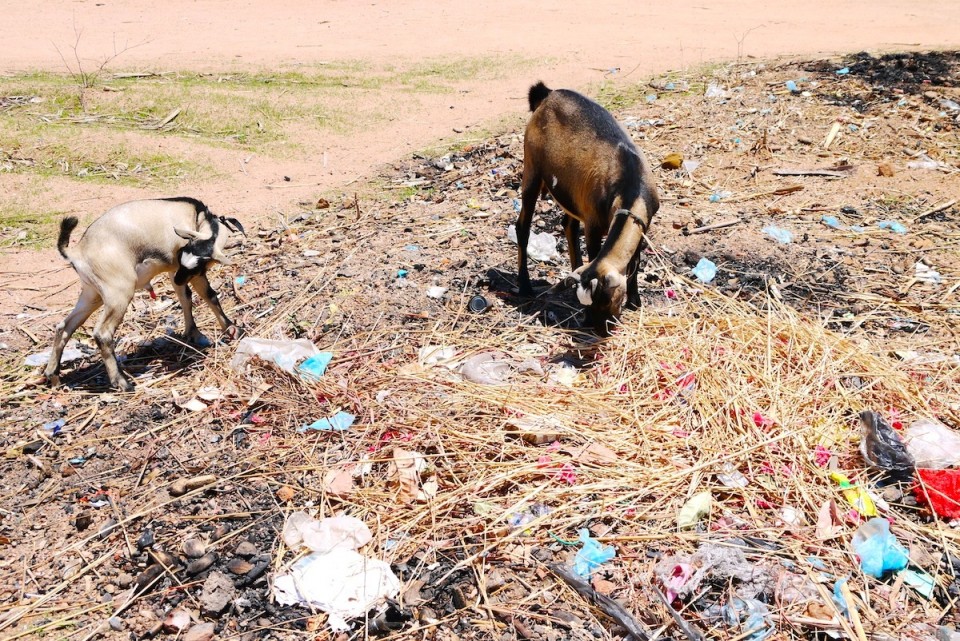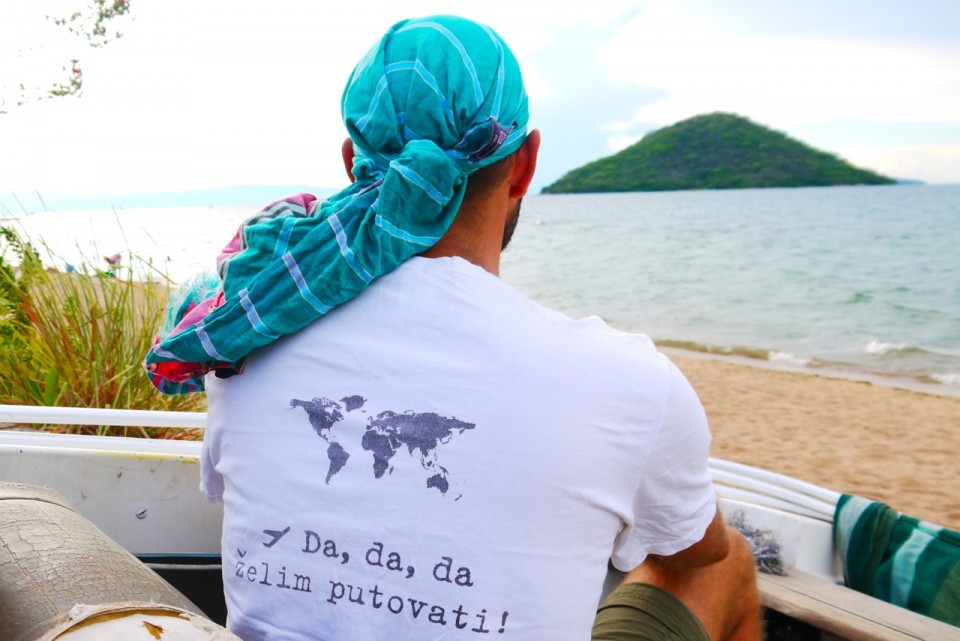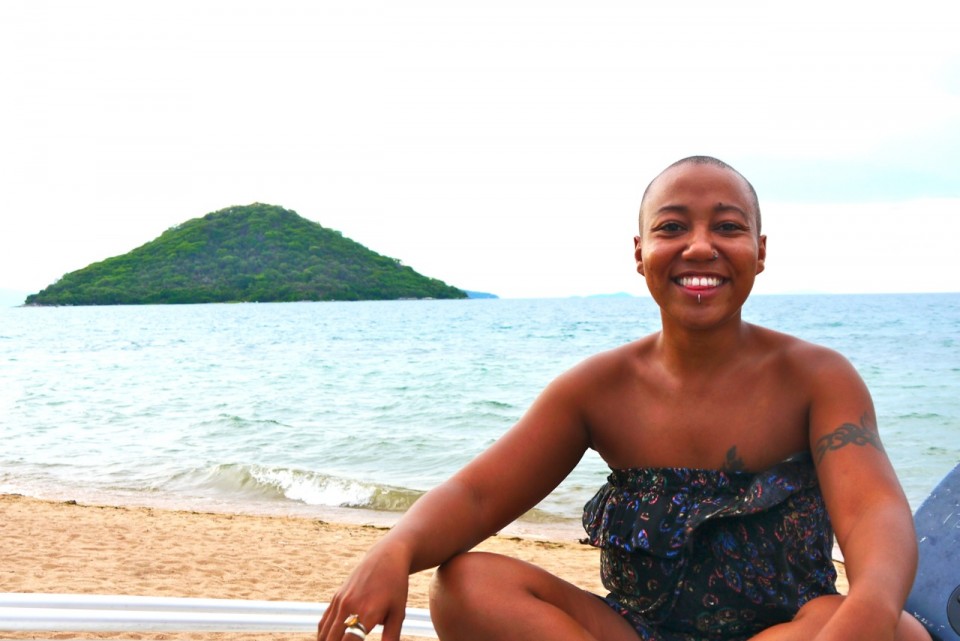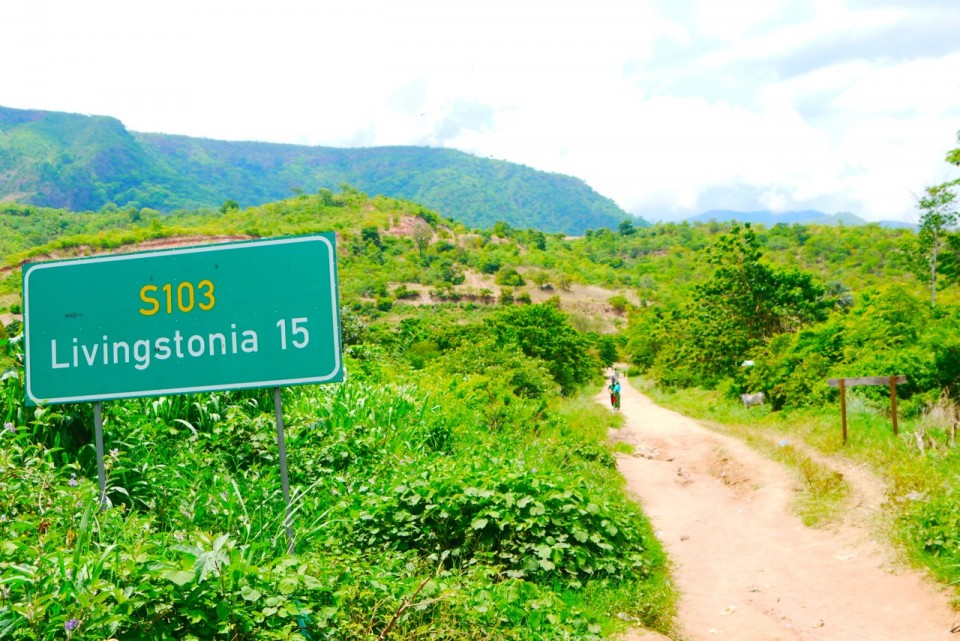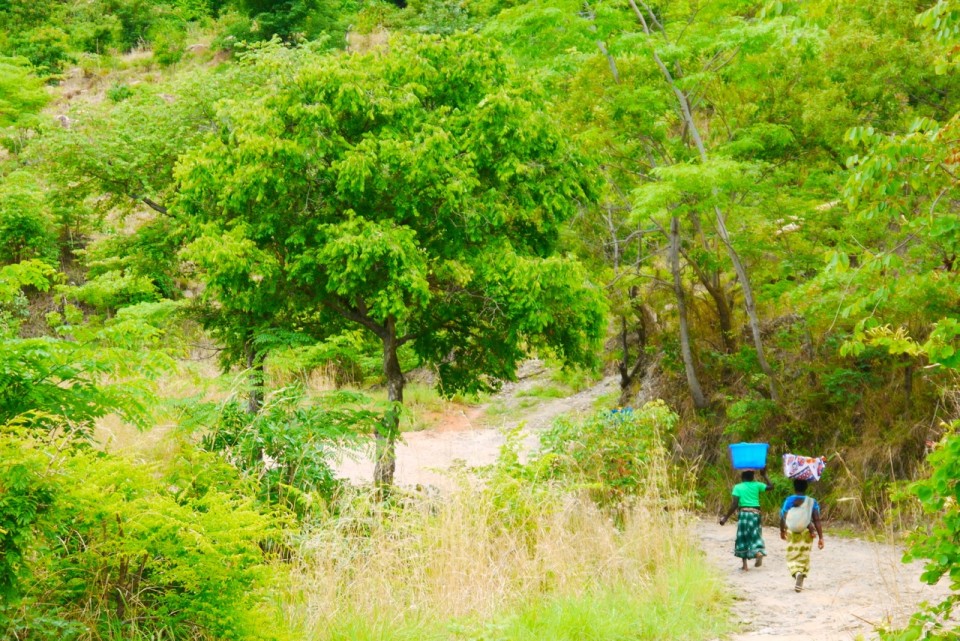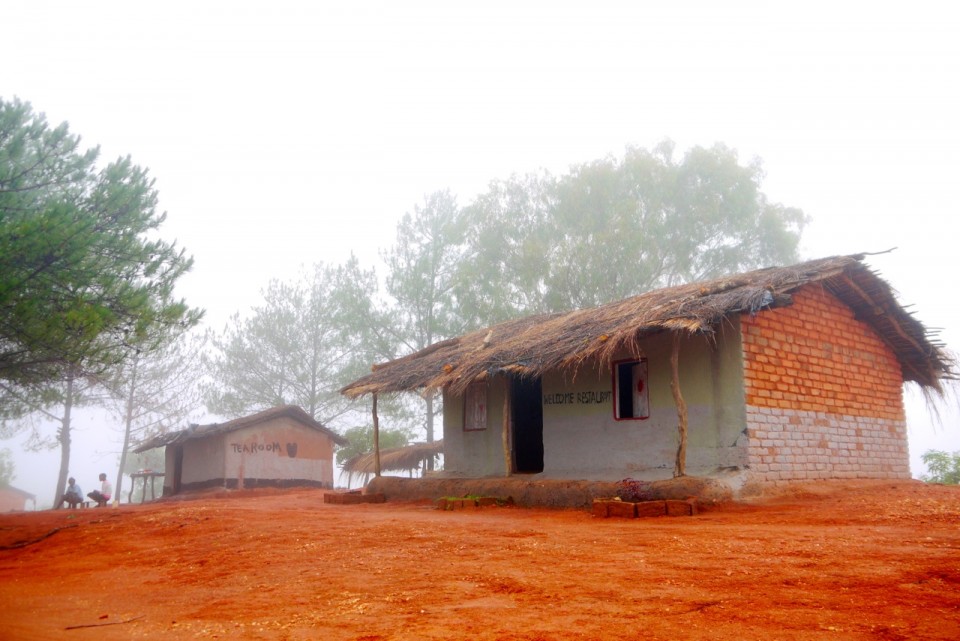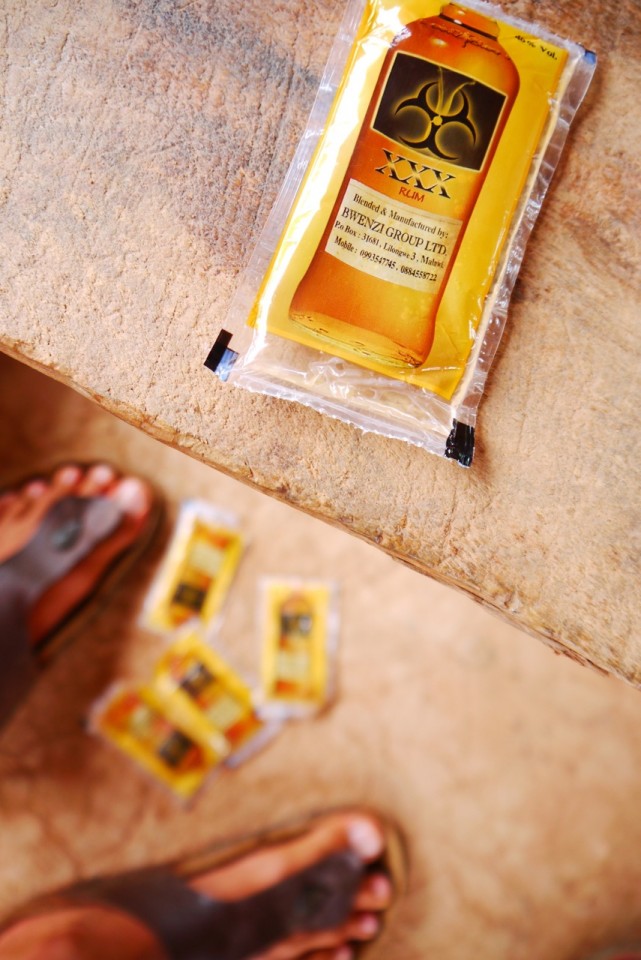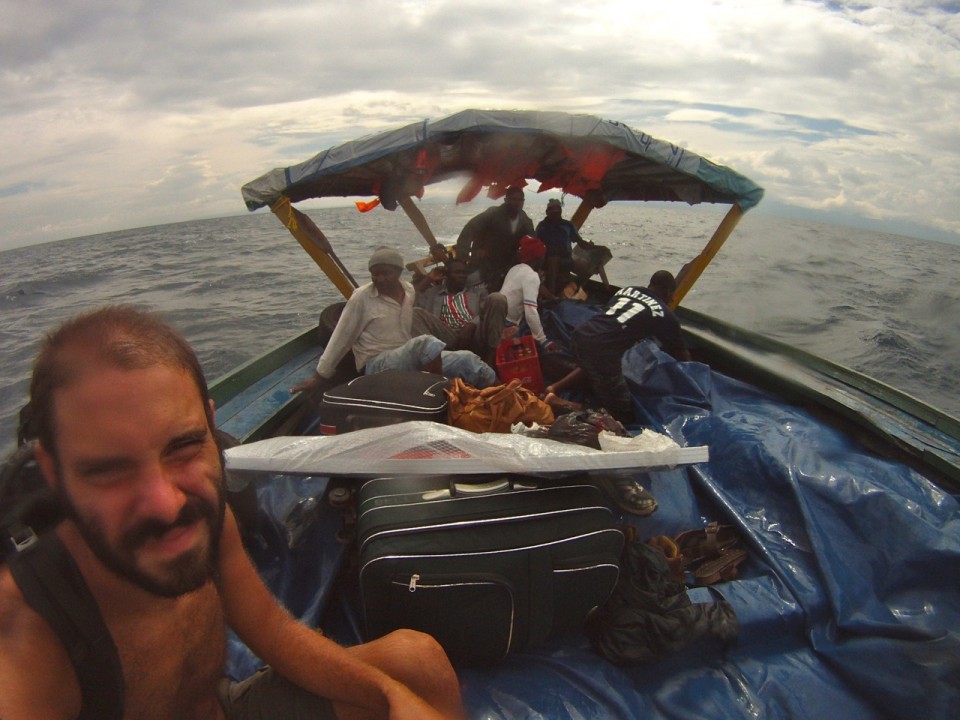After a few days spent playing bao under Moses’s steady eye I managed to win for the first time. I wasn’t that exhilarated because I was quite sure that the master adapted the game to my capacities as a student amateur. However, that victory changed a couple of things. First, I finally felt confident enough to challenge the locals for a game.
Since every day I would take a walk down the streets of the village, I knew that bao, in lack of other things to do, was one of the main things to do to kill some time for the majority of males in Cape Maclear. The kids would usually play in the morning; during the hottest part the day there was no one on the streets; and in the afternoon the adults would slowly start gathering under the shadow of the barracks and play until the sunset.
They accepted me straight away in their little group: some of them knew me from my strolls (I always tried to keep a smile on my face, pace slowly, say hello), some were curious to see how a Mzungu (the African term for a foreigner/white person, even though its original meaning was “the one who wanders aimlessly) would do in their local game. After I managed to win a few games, I won their trust. For the following few days I couldn’t get by without being stopped for a game.
The toughest to play against were the kids who, almost without an exception, beat me in a few minutes. I wondered if they were truly that better than the adults or they were simply less considerate with the amateurs like me.
One way or another, playing bao I became a local; for the first time in Africa. All it took was stay in a place for a longer period of time, explore local life and try to be one of them although the difference was more than obvious.
In order to feel like home and one of them Moses invited me for a dinner to his humble home.
During the dinner, besides delicious food (the base ingredient in all Malawian dishes, but also in other African countries I’d been to was nsima – white polenta – the corn in Africa was white so the flour was white too – served with the usual beans or tomato sauce, or sometimes fish caught in a lake which is, the truth be told, the best I’ve ever tried) we tackled a variety of topics, among which also ecology in Cape Maclear.
There wasn’t a single garbage bin in the whole village; everyone was burning it, instead of throwing it away. The meadows where the cattle grazed were full of plastics and all kinds of trash, and it all ended up on the beach. On one hand, it was quite understandable since people’s lives were centred around the lake: people used it as a shower, a washing machine, even as a toilet. On the other hand, a tourist place shouldn’t permit such kinds of things. The owners of different lodges solved the problem by cleaning only in front of their doorstep. They didn’t care about the rest.
Since Moses shared my worries we got an idea: we would organize the cleaning of the beach and first few meters of the lake!
While Moses was occupied with the administration and putting the whole project on paper, I was spending the days in a boat in front of Malambe camp looking at the lake.
Beach Boys kept on approaching me, still trying to sell me the same stuff. I was approached by the new guests of the camp asking me about the places to visit on their stay there and about the prices. I was approached by the employees of the camp offering me their company, their services and sometimes even asking for a loan. I was also approached by the owner of the camp who complained on the work and on her employees who were stealing from her.
Since I knew both parts of the story I came up with the idea to serve as a middleman and, at least, try to change some things while I was there. A few minutes after I got the idea I went to the owner and offered her my free time, my help and all my effort to solve some problems; all I asked in turn was food and accommodation. She accepted my offer. That is how I became manager of Malambe camp, on the shore of a Malawian lake.
The following few days I talked to the members of the crew (whose monthly salary was 30$, which is the amount of money tourists normally spend in one afternoon) trying to find out their suggestions for improving the working conditions in the camp. After a few days I got some answers which all came down to one: the lack of the trust on the owner’s behalf. And the reason for that is the missing of food, money, beer, and fruit. An enchanted circle.
The more I tried to improve the situation I noticed that one part of the staff changed their attitude towards me. They were disinterested and antagonizing. They were obviously okay with the situation since they could steal from the owner and make up stories since the owner was in a foreign environment and, therefore, was helpless. Since the owner really started to grew to me I gave it some serious thinking about staying there for a while and trying to change some things completely. Things like catching somebody red-handed, firing him/her, starting all over, with new rules.
Soon, I gave it all up. One morning, during breakfast, a group of ten beach boys gathered around me asking me to have a talk with them. I had some ides what they wanted to talk about.
There’s been a word that you’ve been telling the tourists the fair prices – the leader of the nasty-looking group said.
Yeah, so? – I replied, still chewing my food.
Ok, listen boy, here’s how the things work around here. We’ve been doing business here for years. We make our living and feed our families from what we sell to the tourists, souvenirs and boat trips, from organizing barbecue-parties on the beach and stuff like that. And all of a sudden you showed up, a Mzungu who made himself local, and by telling the tourists the real prices you have been ruining our business. We’ve gathered here to have a word with you and ask you not to do it anymore – he finished.
Are you asking me to lie? When tourist come to me and ask me how much I paid for something, you expect me to lie? – I asked noticing that one of them was bouncing awkwardly in place.
You don’t have to lie – the Leader continued – just don’t say anything. After all, we are the ones who have the control in Cape Maclear. We hold control over everything: accommodation, local stores, even the police. It would be a shame if someone made us make some unwanted moves in order to protect our business – he finished his little speech and started walking away beckoning the others to follow him.
Alone in my boat on the shore I inhaled the Malawian anti-depression medicine and finally realized. I got nothing to do there. I got nothing to change there. I was trying to be more powerful than I actually was. I was just a passer-by. No matter how good, noble or revolutionary my ideas were, soon I’d be off and everything would go back as it once was because that was what the ones who had the power wanted. If you wanted a change you had to be there for a while.
Even my project of cleaning the beach turned into a fiasco: everyone was interested in helping and joining in, but in the end it all came down to who would take all the credits for organizing the whole thing, who would ask the financial support from the owners of the places to stay, who would get the money from the international non-profit organizations…once again, it was all about the money.
I gave it all up: Cape Maclear, and the people who lived there. I was seriously thinking about taking off. It was the first time I was in a place despite the people who lived there, and not because of them.
Then, as it usually happens when you’re disappointed with the whole world, I met Kay.
Kay was a local, but different from everyone I’d met before because she didn’t perceive me as a bag of money or an opportunity to get away from the difficult life conditions. She didn’t want to take advantage of me, at least, not financially. She was educated, running one of the lodges. Also, she was cool. I kept playing bao with her, discussed the awful position of women in Africa (they did 90% of the chores around the house, while the men were socializing in the village), came to the conclusion that many charity institutions in Africa primarily served to get money, observed how she dealt with the everyday obstacles in work and, simply, learnt.
Two days after that I moved to her wooden house and remained there for the rest of my stay in Cape Maclear.
It was a nice little place, few steps away from the lake, but distant enough from the others. Hanging out with Kay and her friends I started to believe in the human kind again. Moreover, I started playing: I would go into the lake with the local kids doing all kinds of acrobatics while entering the lake. In the pitch dark I would wander through the village looking for a particular tree with a fragrant flower with help of some confused and playful local men. Sometimes all it takes to forget your problems is a bit of game.
I learnt some of the basic of the local Chichewa language, prepared something to eat using the ingredients I could buy on the local market, discovered the hidden parts of the village, meditated in the middle of the football pitch. I listened to the sounds around me. The goats. A child’s cry in the distance. The birds. The pigeons. They made the same sounds as those in Zagreb.
Once again, I found the peace. And I decided it was time to take off. My date with dad in Kenya was approaching.
I stuck out my thumb and got onto the first truck towards north, while making a stop at the nearby ATM to get some money from my MasterCard, and after a few hours I arrived in Livingstonia.
I walked the last ten kilometers accompanied by some local women who walk that route nearly every day carrying buckets of water and groceries.
Upon the arrival to the top of the hill I visited two camps located in the beautiful nature, but I left as soon as I heard the price of the accommodation. Finally, I chose the third and the most convenient option – a local house which was transformed into a room to be rented to the wandering tourists. Turkish water closet, the water used for showering had to be heated on fire, there was no electricity, and instead of toilet paper you could use the paper from a notebook.
The owners, a brother and a sister, were very good hosts. They prepared me the meals, showed me around a bit, told me all about their difficult life. The sister had a swollen leg, but they couldn’t afford to visit a doctor in order to see what the problem was. The pain, however, didn’t stop her from humming Catholic songs, asking me at the same time whether I was going to church. Just as I was about to answer her, a scared dog crawled slowly towards us and our devoted believer took a slipper and kicked the dog with all her force. Her brother, a bit later, offered me the services of some local girls to help me get through the night.
I left the following day.
While I was waiting for someone to give me a ride to the main road I sat down with some local guys I joined in their conversation. I offered them with some cookies I had with me which resulted in them exchanging looks and giving some comments. When I asked what the problem was they replied with a smile on their faces – this is the first time a Mzungu offers us with something. The big lump in my throat found its way into my stomach with a little help of Malawian specialty – rum packed into plastic 5ml bags that my new friends were sipping.
That evening I ended up in my tent, once again, at the shore of the Malawian lake, but that time in a place called Nkhata Bay. In a hostel nearby I met an Israeli who had been there for a few months doing the same thing I’d been doing in Malambe – he was in charge of a hostel in exchange for food and accommodation.
I asked him how the things were going with the business, whether he tried to change some deep-rooted problems which I experienced in Cape Maclear. He smiled and then told me his story. A few days after arriving there he asked one of the waiters to walk a bit more frequently among the guests and ask them more often what they would like to drink. Since the waiter was quite lazy the new manager fired him after a couple of warnings. A couple of days after that police knocked on his door. They rummaged his room, found three seeds of marijuana and arrested him despite his suffering from malaria. He was free once he bribed the police with twenty thousands money (approx. 50 euro – which was a lot in Malawi).
It was a good thing I didn’t get into that kind of business in my Cape Maclear. Gods knows what the police might have found at my place.
I spent the following few days waiting for some kind of transportation across the lake to get to Tanzania, playing bao with the new waiter in the hostel, met a couple that was walking from Cape Town to Cairo (it took them 10 months to get there), and a girl who was licking her lollipop very seductively. Her answer was “2000” when I asked her for the direction and the distance of the place I was headed to. I guess English wasn’t one of her qualities, but I got the point what could I get for 2000.
The workers in the harbor informed me that a boat was supposed to go to Tanzania. I got there early in the morning; the boat was ready to take me there. However, there was no customs officer on the border. Saturday. That meant that I couldn’t get a stamp in my passport so I couldn’t leave Malawi. The boat left without me.
The day after, Sunday. Another day off. A new boat was expected to go on Monday, and the officer was expected to be on his work place. Still, nothing happened since there was a great storm. Finally, everything was ready on Tuesday – I made a deal with the owner of the boat, got the stamp in my passport and I was ready to go. The boat was full of bags filled with sugar and the lake was corrugated just like the Indian Ocean.
It took us forever to land; I was confused when we stopped few hundred meters from the shore. We waited until the night fell down to dock, and then it hit me: I crossed the lake with sugar smugglers. The beach was crowded with people who under the torch lights put the sugar from the boat into the trucks. There was no sign of civilization, let alone a customs officer who was supposed to give me the visa.
Welcome to Tanzania!
—
GALLERY – MALAWI.
—
YT VIDEO – MALAWI:
